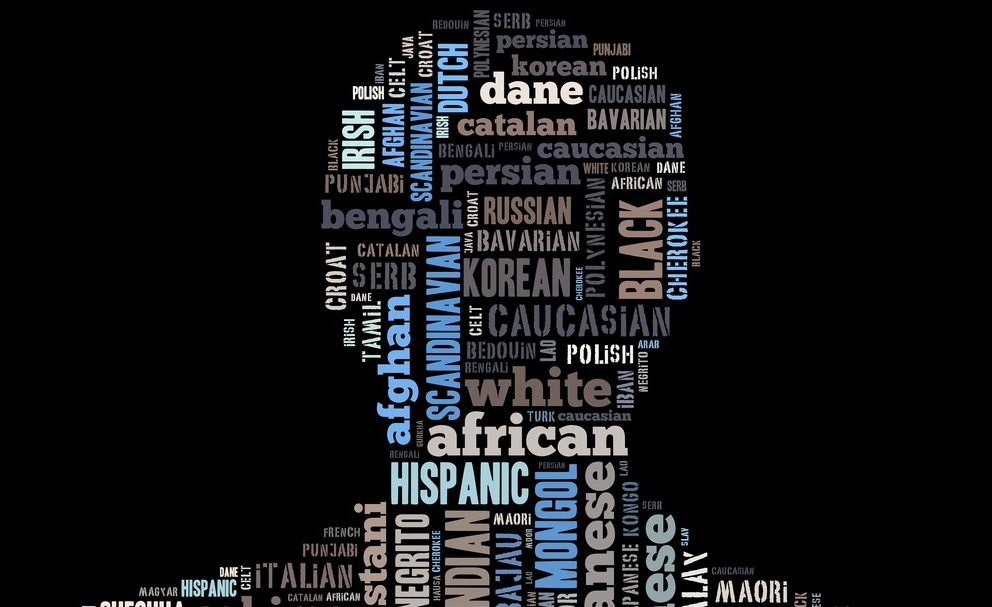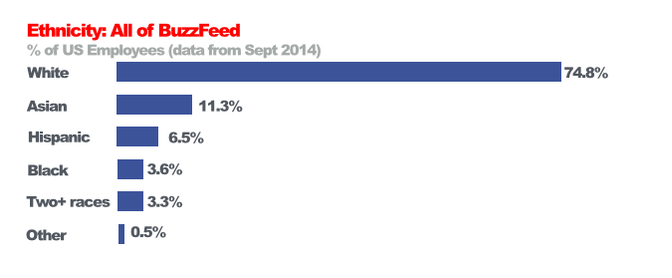Journalism minority advocates praised BuzzFeed Wednesday for releasing internal statistics on its staff diversity, along with a “rough and evolving” hiring guide to ensure minorities are better represented in its future hires.
In an unusual move for a news organization, the site followed in the footsteps of tech companies like Google and Facebook by providing the gender and racial makeup of both its newsroom and overall company staff.
According to the memo emailed to all BuzzFeed employees, then published and tweeted by editor-in-chief Ben Smith, the company’s overall employee makeup is about 75 percent white, 11 percent Asian, 6.5 percent Hispanic, 3.6 percent black and 3.3 percent two or more races. The company also released its editorial staff statistics, which closely mirror the company as a whole.
The number of minority journalists in U.S. newsrooms increased one percent from last year, but has remained between 12 and 14 percent for more than a decade, according to an annual census conducted by the American Society of News Editors.
“We’re certainly not trying to issue ourselves gold stars here,” Smith told American Journalism Review in an interview. “We need to do better. It’s not like there’s a shortage [of journalists] in any of these categories.”
Gender equity was one area where BuzzFeed can boast: The company employs 51.6 percent men overall, but 52.2 percent women in editorial positions. Mekahlo Medina, president of the National Association of Hispanic Journalists, praised the company’s attention to gender equity in recent hiring decisions.
Other tech companies can’t tout statistics like that: Recent reports show that white males make up the overwhelming majority of employees at tech companies like LinkedIn, Apple, Google, eBay, Twitter, and Facebook.
“I’m impressed with the strides it has made with women in its newsroom so far,” Medina said of BuzzFeed. But he said he’s anxious to see how BuzzFeed makes progress with “Latinos, other people of color and LGBT hires.”
“I know with hires like [its new Latino editor] Adrian Carrasquillo, BuzzFeed is on the right track,” he said.
In signature BuzzFeed style, Smith explained in his post why the company is bolstering its commitment to diversity (“4 Reasons It Matters”), and outlined “five things editors should do when hiring”:
1) Understand the beat or field they’re hiring in;
2) Insist on a diverse pool of serious candidates;
3) Look for opportunities to make hires that will increase the diversity of readership;
4) Tap networks beyond their own;
5) Create their own pipeline.
Smith said that releasing the memo on Twitter was an important part of the company’s decision to make its employee data and hiring practices public.
“I like to have our internal conversations on Twitter,” Smith said. “I think it reinforces and puts to the test whatever commitments you’re trying to make … making it public keeps you honest.”
Smith also argued in his post that achieving newsroom diversity is more than an ethical imperative in an industry that has come under fire repeatedly for employee homogeneity. It’s also crucial to succeeding in online news and entertainment, he said.
Leaders of minority journalist organizations agree. Medina, also tech/social media anchor for KNBC, NBC’s West Coast station, told AJR that diversity is a smart business decision.
“I agree with Ben that diversity should not be a ‘side project’ or ‘special initiative,’” Medina said in an email interview. “For any news organization, especially in the country’s largest markets, diversity needs to be part of the strategy. Increasingly, markets are minority-majorities and people of color are largely not just part of the audience, but are the audience.”
Organizations advocating for newsroom diversity praised BuzzFeed’s efforts, with the National Association of Black Journalists (NABJ) calling for Politico, which was embroiled recently in a debate over the relevance of its reporters’ race, to follow suit.
.@ggbirnbaum Will we see @Politico issue a #mediadiversity manfesto like @BuzzFeed did, with specific plans to diversify your newsroom?
— NABJDigital (@NABJDigital) October 1, 2014
Benét Wilson is a former NABJ chair and one of the founders of the Journalism Diversity Project, a website that curates and highlights the profiles of excellent digital journalists of color. Wilson cheered BuzzFeed’s actions Wednesday, and said she’s observed how its past hiring efforts paid off in content.
Most media are still hiding behind the “we can’t find someone qualified” excuse for their lack of minority journalists, she said.
“BuzzFeed’s ethnicity needs some work, but they admitted that,” she said. “The fact that [Smith] has put this out there and said ‘this is what we’re going to do’ is huge.”
Wilson, now social media editor at the Aircraft Owners and Pilots Association, is a member of both NABJ and NAHJ, and serves on the board of the Online News Association. She said new media startups, more often than traditional media, tend to seek her advice about hiring journalists of color.
“A lot of new media organizations realize ‘Hey, we need to do something about this,’” Wilson said. “ I hope that other newsrooms will release their stats too, but I’m not going to sit around and wait for that … I don’t think it’s helpful to shame and embarrass [other organizations]. Better to show them this is a good practice.”
BuzzFeed’s list of practices is “pretty good,” Wilson said, adding that she’d like to see the company at different conventions and conferences for minority journalists. Tapping networks outside of your own is key, she said.
“It’s easy, in life, to go with people you know,” she said, echoing a point in Smith’s post. “We all do that. But when it comes to hiring, I don’t think you have that luxury.”
BuzzFeed is prepping for another round of “aggressive hiring” in its news division, according to Smith — a silver lining in the journalism community on a day when the New York Times announced a round of deep cutbacks. Making BuzzFeed’s hiring guide public keeps diversity “front and center” as they proceed, he said.
This move, and others such as the firing of viral politics editor Benny Johnson following accusations of plagiarism, mark BuzzFeed’s increasingly dogged focus on branding itself as a provider of serious journalism. In August, BuzzFeed published responses from 13 news organizations that answered its survey questions about diversity in the newsroom.
Despite their optimism over BuzzFeed’s diversity manifesto, Wilson and other leaders of minority journalist networks are cautious not to celebrate too much soon.
“The proof is in the pudding,” Wilson said. “I would love to come back in a year and take a look at their numbers.”









Leave a Comment